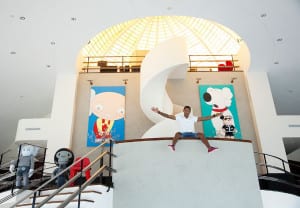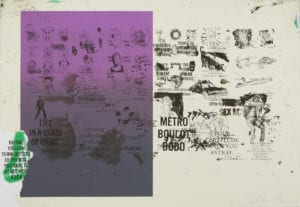For this month’s installment of “Jobs in the Art World,” we caught up with Anita Durst, the founder and artistic director of Chashama. An arts non-profit that transforms unused spaces into studios and performance venues, Chashama has been fostering creative communities in all five boroughs of New York City since 1995. Anita spoke with us about her passion for the arts and her vision for Chashama. She reflected on her past experiences and even shared some key pieces of advice for succeeding in the art world. Check them out below.
Art Zealous: What do you look for when you are choosing artists for Chashama?
Anita Durst: We are looking for artists who have a strong vision and body of work. We want artists that are willing to take a chance and go beyond the norm; they have to have that certain spark. We want people that can look beyond the regular and completely transform a space.
AZ: How did you come up with the name Chashama?
AD: I was looking through an old dictionary, I saw the word and it meant shame. I thought we could be the Theater of Shame. I thought this represented what I felt because I was young, restless, and rebellious. I felt the world was a shameful place and I wanted to be a part of changing it. Since that time, I have learned that Chashama has many other meanings such as spring outlet, ‘to have vision,’ friendship, and soul. As the non-profit has grown in scope, so has the depth of meaning the word contains when I think of it.
AZ: What’s your professional background? Did you always know you wanted to be involved in the arts?
AD: My professional background began when I was 18 years old as an intern at En Garde Arts with Anne Hamburger. They would take unused spaces in New York and transform them into theaters. Working with Anne inspired me to take underutilized space and transform them into work and presentation space for artists. I am very proud that Chashama has transformed over 80 locations, presented 2,000 shows, and worked with over 20,000 artists in the past 22 years.
I knew I wanted to be involved with the arts after working with Reza Abdoh. He showed me the power of creativity and how you can connect to yourself and others through the creative process.
AZ: What are some of the biggest challenges of running an arts-based non-profit in New York City?
AD: One huge challenge is the competition for funding. There are more non-profits today than there were 20 years ago. Another challenge is keeping a savvy staff that is willing to think outside of the box and help Chashama stand out amongst the dozens of arts non-profits in NYC.
AZ: What advice do you have for someone who wants to start a non-profit in the arts sector?
AD: To have a vision, a business plan, and to know whom your support group is. In addition, passion is extremely important. If you are truly passionate about the cause, that provides motivation when things get difficult.
AZ: What are some of the most memorable projects you have ever seen an artist do in one of Chashama’s spaces?
AD: Some of the most memorable projects were on 42nd between 6th Avenue and Broadway. Chashama had seven storefronts for ten years and presented over 700 shows there. Some of my favorites were: “The 47 Ninja Clowns”, where anybody who walked by could come in and play theater games such as participate in a swim noodle sword fight or play follow the leader with us. The Bindlestiff Family Circus presented shows for about five years. ‘Couch Talk’ was centered around a woman what would sit in the window in our space on 42nd Street, on her pink blow up couch, with a huge sign on top of her head that said: “Call Me.” She would talk to passersby from 10-3 AM via cell phone. Of the 2,000 shows that we have presented there are so many wonderful memories being able to marry yourself, a girl who took all her possessions and sold them in the window—bartering each item—and then moved into a truck, the fire show by Flambeaux: Master of the Flames.
AZ: What can we expect to see from Chashama in the future?
AD: Chashama’s dream is to have no space left empty in New York. What we would like to do is to have as many property owners on our waiting lists as we do artists (1,000). I believe that empty space has a negative effect, and a space with people and energy drives commerce, positivity, and community.
AZ: What’s the most memorable avant-garde performance that you have participated in?
AD: In 1990, in the Meat Packing District looked much different than it does today. There weren’t many trendy shops and restaurants, but mostly meat warehouses. That was our setting for Reza Abdoh’s Father was a Peculiar Man. I played Marilyn Monroe with a cast of 60 others. We sang and danced our hearts out with a 125-foot dinner table on West 12th Street as well as a house that blew up on Gansevoort, and many other spectacular and extraordinary sights.
AZ: Any advice for a young aspiring artist who wants to make a difference in the world?
AD: To have passion, fun, and never give up. Interning was a great first step for me; I would suggest that to any young aspiring artist. It helps you to gain a network that can lead to many paths. Interning also gives you the opportunity to learn how different people operate which can help you figure out how you work best.
AZ: What do you look for in a candidate when you are hiring?
AD: When we are hiring someone at Chashama, we look for people who pay attention to detail, have vision, and are open-minded. We want someone that feels a connection to our cause that is willing to go the extra mile for Chashama and what we believe in. Dedication is one of the most important things when working for a non-profit organization and when you have that connection, the dedication is second nature.
AZ: Best piece of professional advice you received from a mentor or someone you look up to in the arts?
AD: The best piece of professional advice I know: “A ‘no’ received is a step closer to yes.”
AZ: Something you know now that you wish you would have known back then?
AD: Keeping emails! Also, definitely staying focused and taking care of myself. It is very easy to get distracted from work and your own well-being when you’re young, but it’s incredibly important to keep both of those things in check.
AZ: How can we keep in touch?
AD: You can find us at www.chashama.org, on Instagram @chashama, and on Facebook for all good news and updates.
top photo // courtesy of



